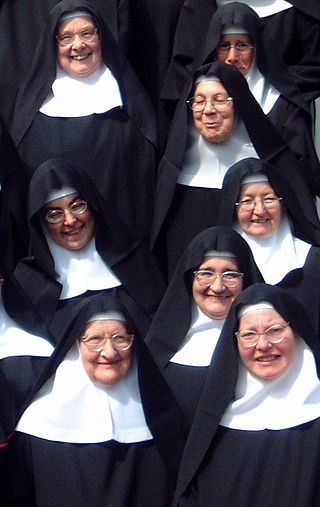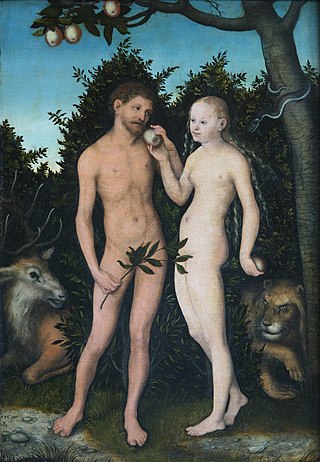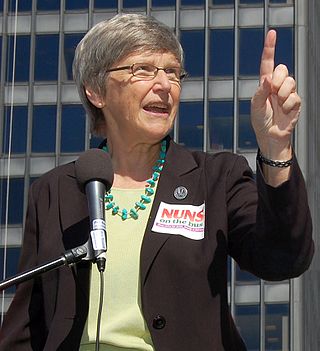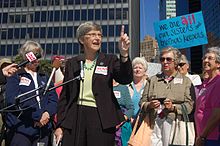
A nun is a woman who vows to dedicate her life to religious service and contemplation, typically living under vows of poverty, chastity, and obedience in the enclosure of a monastery or convent. The term is often used interchangeably with religious sisters who do take simple vows but live an active vocation of prayer and charitable work.

With 23 percent of the United States' population as of 2018, the Catholic Church is the country's second largest religious grouping, after Protestantism, and the country's largest single church or Christian denomination where Protestantism is divided into separate denominations. In a 2020 Gallup poll, 25% of Americans said they were Catholic. The United States has the fourth largest Catholic population in the world, after Brazil, Mexico, and the Philippines.

The Catholic Church, also known as the Roman Catholic Church, is the largest Christian church, with 1.3 billion baptized Catholics worldwide as of 2019. It is among the world's oldest and largest international institutions, and has played a prominent role in the history and development of Western civilization. The church consists of 24 sui iuris churches, including the Latin Church and 23 Eastern Catholic Churches, which comprise almost 3,500 dioceses and eparchies located around the world. The pope, who is the bishop of Rome, is the chief pastor of the church. The bishopric of Rome, known as the Holy See, is the central governing authority of the church. The administrative body of the Holy See, the Roman Curia, has its principal offices in Vatican City, a small enclave of the Italian city of Rome, of which the pope is head of state.
The Sisters of Perpetual Indulgence (SPI), also called Order of Perpetual Indulgence (OPI), is a charitable, protest, and street performance movement that uses drag and religious imagery to satirize issues of sex, gender, and morality and fundraise for charity. In 1979, a small group of gay men in San Francisco began wearing the attire of Catholic nuns in visible situations using camp to promote various social and political causes in the Castro District.

Raymond Leo Burke is an American prelate of the Catholic Church. A bishop, cardinal, who was patron of the Sovereign Military Order of Malta from 2014 to 2023. He led the Archdiocese of St. Louis from 2004 to 2008 and the Diocese of La Crosse from 1995 to 2004. From 2008 to 2014, he was the prefect of the Supreme Tribunal of the Apostolic Signatura.

The Eternal Word Television Network, more commonly known by its initials EWTN, is an American basic cable television network which presents around-the-clock Catholic-themed programming. It is not only the largest Catholic television network in America, but reportedly "the world's largest religious media network", reaching 250 million people in 140 countries, with 11 networks. It was founded by Mother Angelica, in 1980 and began broadcasting on August 15, 1981, from a garage studio at the Our Lady of the Angels Monastery in Irondale, Alabama, which Mother Angelica founded in 1962. She hosted her own show, Mother Angelica Live, until health issues led to her retirement in September 2001. As of 2017, Michael P. Warsaw, who is a consultant to the Vatican's Dicastery for Communications, leads EWTN.
NETWORK Lobby for Catholic Social Justice is a national Catholic social justice lobby founded in 1971 and headquartered in Washington, D.C. The organization focuses its lobbying efforts in the areas of economic justice, immigration reform, healthcare, peace making and ecology.
Catholic Democrats is an American not-for-profit organization of Catholics to support the Democratic Party, based in Boston, United States. The Catholic Democrats have more than 60,000 members in all 50 American states and Puerto Rico. It claims no authorization from the Catholic Church, or any Catholic bishop, Catholic diocese, candidate or candidate committee.

Leonard Paul Blair is an American prelate of the Roman Catholic Church, serving as archbishop of the Archdiocese of Hartford in Connecticut since December 16, 2013.
The Leadership Conference of Women Religious (LCWR) is one of two associations of the leaders of congregations of Catholic women religious in the United States. LCWR includes over 1300 members, who are members of 302 religious congregations that include 33,431 women religious in the United States as of 2018. Founded in 1956, the conference describes its charter as assisting its members to "collaboratively carry out their service of leadership to further the mission of the Gospel in today's world." The canonically-approved organization collaborates in the Catholic Church and in society to "influence systemic change, studying significant trends and issues within the church and society, utilizing our corporate voice in solidarity with people who experience any form of violence or oppression, and creating and offering resource materials on religious leadership skills." The conference serves as a resource both to its members and to the public who are seeking resources on leadership for religious life.
The Catholic Church has been criticised in fiction, such as literature, film and television. Polemics have also been written on the Church and its practices. Some examples are the anti-Catholic stereotypes that filled Gothic fiction of Anglican England, the films of Luis Buñuel who took issue with the Church in Spain, the humor of some US television pundits like Rosie O'Donnell, and the rhetoric of some fundamentalist preachers.

Women play significant roles in the life of the Catholic Church, although excluded from the Catholic hierarchy of bishops, priests, and deacons. In the history of the Catholic Church, the church often influenced social attitudes toward women. Influential Catholic women have included theologians, abbesses, monarchs, missionaries, mystics, martyrs, scientists, nurses, hospital administrators, educationalists, religious sisters, Doctors of the Church, and canonised saints. Women constitute the majority of members of consecrated life in the Catholic Church: in 2010, there were around 721,935 professed women religious. Motherhood and family are given an exalted status in Catholicism, with The Blessed Virgin Mary holding a special place of veneration.

"A Catholic Statement on Pluralism and Abortion", alternatively referred to by its pull quote "A Diversity of Opinions Regarding Abortion Exists Among Committed Catholics" or simply "The New York Times ad", was a full-page advertisement placed on October 7, 1984, in The New York Times by Catholics for a Free Choice (CFFC). Its publication brought to a head the conflict between the Vatican and those American Catholics who were pro-choice. The publicity and controversy which followed its publication helped to make the CFFC an important element of the pro-choice movement.

Agnes Mary Mansour was an American former Catholic nun, as well as a politician and public official. She is known for having been given a choice from the Vatican in 1983 to end her religious vows or to resign from her position as the director of the Michigan Department of Social Services, which required her to support and allocate public funding for abortions. The controversy involved her belief that abortion was tragic but should be legal, despite her vows as a religious and the teachings of the Catholic Church.
The Catholic Church and abortion in the United States deals with the views and activities of the Catholic Church in the United States in relation to the abortion debate. The Catholic Church opposes abortion and has campaigned against abortion in the United States, both saying that it is immoral and making statements and taking actions in opposition to its classification as legal.
The Fortnight for Freedom is a campaign initiated by the Roman Catholic bishops of the United States. Events over the course of fourteen days from June 21 to July 4 each year, call upon Catholics to participate in a pledge to religious liberty and an appeal for the inclusion of a "conscience clause" for religious institutions and religious faithful to practice according to the moral tenets of one's religious faith.
The Franciscan Action Network (FAN) is a faith-based 501(c)(3) non-profit organization in Washington DC composed of Franciscan sisters, friars, secular Franciscans, and others. The organization was created to address issues regarding ecology, human rights, poverty, and general peacemaking in the United States.
Catholic resistance to Nazi Germany was a component of German resistance to Nazism and of Resistance during World War II. The role of the Catholic Church during the Nazi years remains a matter of much contention. From the outset of Nazi rule in 1933, issues emerged which brought the church into conflict with the regime and persecution of the church led Pope Pius XI to denounce the policies of the Nazi Government in the 1937 papal encyclical Mit brennender Sorge. His successor Pius XII faced the war years and provided intelligence to the Allies. Catholics fought on both sides in World War II and neither the Catholic nor Protestant churches as institutions were prepared to openly oppose the Nazi State.

Simone Campbell, SSS, is an American Catholic religious sister, lawyer, lobbyist and executive director of NETWORK. She belongs to the Sisters of Social Service. She is known as an outspoken advocate for social justice.
During the Holocaust, the Catholic Church played a role in the rescue of hundreds of thousands of Jews from being murdered by the Nazis. Members of the Church, through lobbying of Axis officials, provision of false documents, and the hiding of people in monasteries, convents, schools, among families and the institutions of the Vatican itself, saved hundreds of thousands of Jews. The Israeli diplomat and historian Pinchas Lapide estimated the figure at between 700,000 and 860,000, although the figure is contested.











